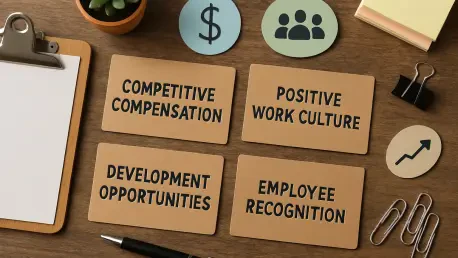In today’s rapidly evolving workplace, a new wave of talent is reshaping how organizations operate, bringing with them distinct values, expectations, and approaches to career development that challenge traditional norms. Generation Z, often defined as those born between the mid-to-late 1990s and early 2010s, has emerged as a significant force in the labor market, compelling employers to rethink conventional retention strategies. With a penchant for agility and a desire for meaningful growth, this demographic is not content with stagnant roles or outdated workplace norms. Statistics reveal a striking trend: half of Gen Z employees have switched jobs at least twice in recent years, far outpacing the mobility rates of Millennials and Gen X. This fluidity signals a shift in professional loyalty, often leaving companies grappling with high turnover. As businesses strive to harness the potential of this dynamic group, understanding their unique needs and crafting innovative approaches to engagement becomes paramount for long-term success.
Understanding Gen Z’s Workplace Dynamics
Career Mobility and the Shift in Loyalty
A defining characteristic of Gen Z in the workplace is their remarkable career mobility, which sets them apart from previous generations. Research indicates that a significant portion of these young professionals—around 50%—have changed roles multiple times in a short span, a rate notably higher than their Millennial and Gen X counterparts. This frequent job-hopping reflects a preference for external opportunities over internal progression, with nearly a quarter of Gen Z workers seeking growth outside their current organizations. Termed the ‘Work Situationship,’ this trend highlights a departure from long-term commitments, often perceived by employers as a lack of loyalty. However, this behavior is less about disengagement and more about a pursuit of roles that align with personal aspirations and rapid advancement. For companies, recognizing this mindset is the first step toward building environments that can adapt to such fluid career paths while still fostering a sense of belonging among these employees.
Mismatched Expectations and Retention Challenges
Beyond mobility, a critical barrier to retaining Gen Z talent lies in the disconnect between their expectations and the strategies employers currently deploy. Surveys show that a staggering 70% of businesses struggle to keep this demographic, with over half attributing the issue to misaligned workplace priorities. While competitive salaries and flexible arrangements remain important, career progression stands out as a primary driver for 59% of Gen Z workers. This generation is acutely aware of their strengths and areas for improvement, particularly in leadership skills, and they actively seek opportunities to address these gaps. When such growth paths are unclear or inaccessible, dissatisfaction sets in, prompting exits. Businesses must therefore pivot from generic retention tactics to more personalized approaches that prioritize clear advancement opportunities, ensuring that Gen Z employees see a future within the organization that matches their ambitions.
Building Effective Retention Strategies
Tailored Learning and Development Programs
To effectively engage Gen Z, organizations must prioritize learning and development programs that are customized to their unique needs rather than applying a uniform approach across all generations. This demographic craves rapid career advancement, often valuing mentorship and structured guidance over traditional perks. Pairing them with experienced colleagues can provide the hands-on learning they seek, helping to bridge skill gaps in areas like managerial competencies. Data suggests that Gen Z responds well to initiatives that offer clear milestones and actionable feedback, enabling them to track their progress. By investing in digital tools alongside in-person training, companies can create a blended learning environment that resonates with this tech-savvy group. Such targeted programs not only enhance individual growth but also demonstrate a commitment to their professional journey, which is crucial for fostering loyalty in a generation prone to seeking better opportunities when development stalls.
Fostering Cross-Generational Collaboration
Another vital strategy for retaining Gen Z talent involves addressing the generational tensions that often surface in diverse workplaces. Reports indicate that a majority of Gen Z employees feel misunderstood by older peers, while over half of Gen X workers note stark differences in work ethic. These divides can hinder collaboration and create friction, ultimately impacting retention. To counter this, organizations should implement initiatives that encourage dialogue and empathy across age groups, such as team-building activities or reverse mentoring programs where younger employees share digital expertise with seasoned staff. Building an inclusive culture that values diverse perspectives turns potential conflict into a strength, allowing Gen Z to feel respected and integrated. When generational differences are framed as opportunities for mutual learning, the workplace becomes a more cohesive environment, reducing turnover and enhancing overall productivity.
Embracing a People-First HR Approach
Finally, adopting a people-first approach in human resources strategies has proven to be a game-changer in past efforts to retain Gen Z employees. By leveraging data and employee feedback, companies have successfully uncovered deeper motivations and aspirations, tailoring support to individual needs. Combining digital platforms with face-to-face engagement ensured that communication remained open, allowing all generations to feel valued. This method not only improved retention rates but also transformed generational diversity into an organizational asset. Looking ahead, HR leaders should continue refining these strategies, focusing on personalized development plans and upskilling opportunities. By maintaining a commitment to meaningful growth and fostering environments where cross-generational collaboration thrives, businesses can turn challenges into competitive advantages, setting a strong foundation for navigating the ever-changing dynamics of the modern workforce.









